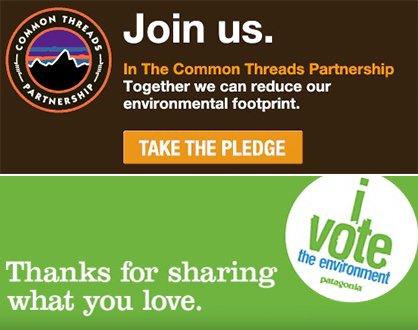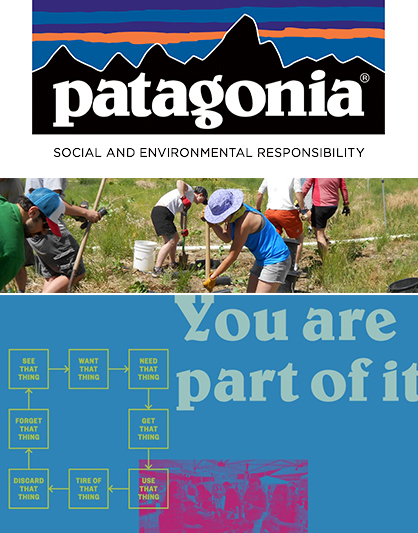Patagonia on being a responsible company
Patagonia is one of the best-known names among retailers who innovate in corporate responsibility and environmental sustainability. The company, with 1,350 employees and $540 million in annual revenue, has grown substantially since Yvon Chouinard founded Patagonia in his blacksmith shop in Ventura, Calif., more than 40 years ago.
According to Inc., Patagonia gives away 1 percent of its annual sales to 650 environmental organizations through its 1% for the Planet program, as previously written about in LadyLUX. This program is a growing global movement of more than 1000 companies that donate 1% of their sales to a network of more than 3000 approved environmental organizations worldwide. Craig Mathews, the owner of Blue Ribbon Flies, and Chouinard came up with the idea in 2001 and there are now more than 1,800 companies who have joined. As Chouinard said to Inc., “Investing in the well-being of our planet makes good business sense.”
The company explains on its website, “We are in the earliest stages of learning how what we do for a living both threatens nature and fails to meet our deepest human needs. The impoverishment of our world and the devaluing of the priceless undermine our physical and economic well-being.
“Yet the depth and breadth of technological innovation of the past few decades shows that we have not lost our most useful gifts; humans are ingenious, adaptive, clever. We also have moral capacity, compassion for life, and an appetite for justice. We now need to more fully engage these gifts to make economic life more socially just and environmentally responsible, and less destructive to nature and the commons that sustain us.”
And in the ultimate of humble behavior, Patagonia admits that it’s not the model of a responsible company. “We can’t pose Patagonia as the model of a responsible company. We don’t do everything a responsible company can do, nor does anyone else we know. But we can tell you how we came to realize our environmental and social responsibilities, and then began to act on them. Like other things in human life, it began with one step that led to another.”
The story of how Patagonia came to be so responsible began simply. The company opened its first store in Boston in 1988 and within days, employees were sick, mostly with headaches. An engineer said the ventilation system was the problem because it was recycling the air and there was likely formaldehyde in the air from the finish on the cotton clothes stored in the basement. So the company commissioned a study on conventional cotton and realized that cotton grown with pesticides is one of the most destructive crops in agriculture. Patagonia went organic in 1996.

Patagonia encourages its employees to support environmental work, by offering an Environmental Internship Program, staging an annual Salmon Run with proceeds going to local environmental nonprofit groups, hosting a Bike-to-Work Week every spring, and volunteering in Chile to restore a former sheep ranch and create what will soon become Chile’s newest national park. There are numerous other ways that employees volunteer through causes supported by Patagonia.
Patagonia said, on its website, “The time has come for business people to understand our companies as a part of, not apart from, the natural world; as reliant on, and owing something back to, the human communities our businesses so crucially affect. In a time of economic sea change and ecological crisis, we need to work together around the table to reduce the astonishing environmental cost of everything we make, and to create a more sustainable economy, throughout the supply chain, wherever we do business. No company is an island; the more we work together, the quicker we can put a stop to long-term environmental damage, so that those who come after us inherit a world we would want to live in.”
Corporate responsibility is a huge part of Patagonia’s overall goal, by promoting fair labor practices and safe working conditions throughout the company’s supply chain. It encourages companies to take responsibility for the impact of their activities on customers, employees, communities and the environment. Companies committed to corporate responsibility also agree to abide by international labor and human rights standards.
The current campaign at Patagonia is The Responsible Economy. The company said, “Today we are using the equivalent resources of one and a half planets, yet we live on only one. All the indicators of earthly health are in deteriorating: plentiful freshwater, clean air, arable land, robust fisheries and biodiversity. How do we reverse this decline (and accompanying climate change) before it becomes catastrophic?” Patagonia goes on to say that, “We know we must consume less, and far more slowly – as well as innovate as quickly and ingeniously as we can.”
A responsible economy is one that cultivates healthy communities, creates meaningful work, and takes from the earth only what it can replenish. It’s one where all the indicators currently going in the wrong direction – CO2 emissions, ocean acidification, deforestation, desertification, species extinction, water contamination, toxic chemical release – all those things that are leading us to bankruptcy, will even out, then reverse.
During the next two years, Patagonia will explore these questions. Chouinard said, on the company’s website, “This is the most ambitious and important endeavor we’ve ever undertaken. Our other environmental campaigns (the depletion of the oceans, pollution of water, obstacles to migration paths for animals) have been about the symptoms of this problem. Now we are addressing the core.”
Tagged in: nonprofit, corporate social responsibility, nonprofit organization,
Tagged in: nonprofit, corporate social responsibility, nonprofit organization,






